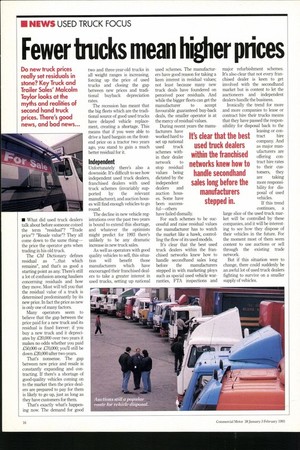Fewer trucks mean higher prices
Page 18

If you've noticed an error in this article please click here to report it so we can fix it.
Do new truck prices really set residuals in stone? Key Truck and Trailer Sales' Malcolm Taylor looks at the myths and realities of second hand truck prices. There's good news, and bad news...
• What did used truck dealers talk about before someone coined the term "residual"? "Trade price"? "Resale value"? They all come down to the same thing— the price the operator gets when trading in his old truck.
The CM Dictionary defines residual as "...that which remains", and that's as good a starting point as any. There's still a lot of confusion among hauliers concerning residuals and how they move. Most will tell you that the residual value of a truck is determined predominantly by its new price. In fact the price as new is only one of many factors.
Many operators seem to believe that the gap between the price paid for a new truck and its residual is fixed forever: if you buy a new truck and it depreciates by £20,000 over two years it makes no odds whether you paid £50,000 or £70,000; you'll still be down £20,000 after two years.
That's nonsense. The gap between new price and resale is constantly expanding and contracting. If there's a shortage of good-quality vehicles coming on to the market then the price dealers are prepared to pay for them is likely to go up, just as long as they have customers for them.
That's exactly what's happening now. The demand for good two and three-year-old trucks in all weight ranges is increasing, forcing up the price of used trucks and closing the gap between new prices and traditional buyback depreciation rates.
The recession has meant that the big fleets which are the traditional source of good used trucks have delayed vehicle replacement, creating a shortage. This means that if you were able to drive a hard bargain on the frontend price on a tractor two years ago, you stand to gain a much better residual for it.
Independent Unfortunately there's also a downside. It's difficult to see how independent used truck dealers, franchised dealers with used truck schemes (invariably supported by the relevant manufacturer), and auction houses will find enough vehicles to go round.
The decline in new vehicle registrations over the past two years is bound to extend this shortage, and whatever the optimists might predict for 1993 there's unlikely to be any dramatic increase in new truck sales.
As well as operators with good quality vehicles to sell, this situation will benefit those manufacturers which have encouraged their franchised dealers to take a greater interest in used trucks, setting up national used schemes. The manufacturers have good reason for taking a keen interest in residual values; not least because many new truck deals have foundered on perceived poor residuals. And while the bigger fleets can get the manufacturer to accept favourable guaranteed buy-back deals, the smaller operator is at the mercy of residual values.
During recent years the manufacturers have worked hard to set up national used truck schemes within their dealer network to stop residual values being dictated by the independent dealers and auction houses. Some have been successful—others have failed dismally.
For such schemes to be successful and raise residual values the manufacturer has to watch the market like a hawk, controlling the flow of its used models.
It's clear that the best used truck dealers within the franchised networks knew how to handle secondhand sales long before the manufacturers stepped in with marketing ploys such as special used vehicle warranties, FTA inspections and major refurbishment schemes. It's also clear that not every franchised dealer is keen to get involved with the secondhand market but is content to let the auctioneers and independent dealers handle the business.
Ironically the trend for more and more companies to lease or contract hire their trucks means that they have passed the responsibility for disposal back to the leasing or contract hire company. And as major manufacturers are offering contract hire rates to their customers, they are taking more responsibility for disposal of used vehicles.
If this trend continues, a large slice of the used truck market will be controlled by these companies, and it will be interesting to see how they dispose of their vehicles in the future. For the moment most of them seem content to use auctions or sell through the existing trade network.
But if this situation were to change, there could suddenly be an awful lot of used truck dealers fighting to survive on a smaller supply of vehicles.






















































































